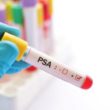New urine test detects high-risk prostate cancers

Prostate cancer is one of the leading causes of cancer death in men. To screen for it, doctors often use a blood test to measure PSA levels. PSA is an enzyme produced by the prostate gland, and higher levels can indicate prostate cancer or other conditions like prostate inflammation. When PSA levels are high, doctors recommend further testing, often including a biopsy. A biopsy involves taking small tissue samples from different areas of the prostate to check for cancer. While biopsies are generally safe, they can be painful and may cause side effects like infections or fever. Many biopsies find slowly growing cancers that don’t require immediate treatment, leading to unnecessary procedures.
Researchers have been trying to find ways to avoid these unnecessary biopsies and better identify which cancers need treatment. Around 10 years ago, researchers developed a urine test called MyProstateScore (MPS), which detects prostate cancer by looking for two genes commonly found at high levels in the urine of men with the disease. However, MPS couldn’t distinguish between slow- growing and aggressive cancers that require treatment.
They reported that in a recent study, researchers created an updated version of the test, called MyProstateScore 2.0 (MPS2). They analyzed RNA sequencing data from over 59,000 genes to find markers linked to aggressive prostate cancers. After narrowing it down, they identified 18 genes detectable in urine that could predict high-grade prostate cancer. They reported in recent tests with nearly 800 men, MPS2 ruled out high- grade cancer with 97% accuracy. This means it could help avoid up to 51% of unnecessary biopsies.
MPS2 was more accurate than the original MPS test, offering a better way to distinguish between cancers that need immediate treatment and those that don’t. This could reduce the need for invasive tests like biopsies and MRIs, improving patient care.
National Institutes of Health. May 7, 2024














